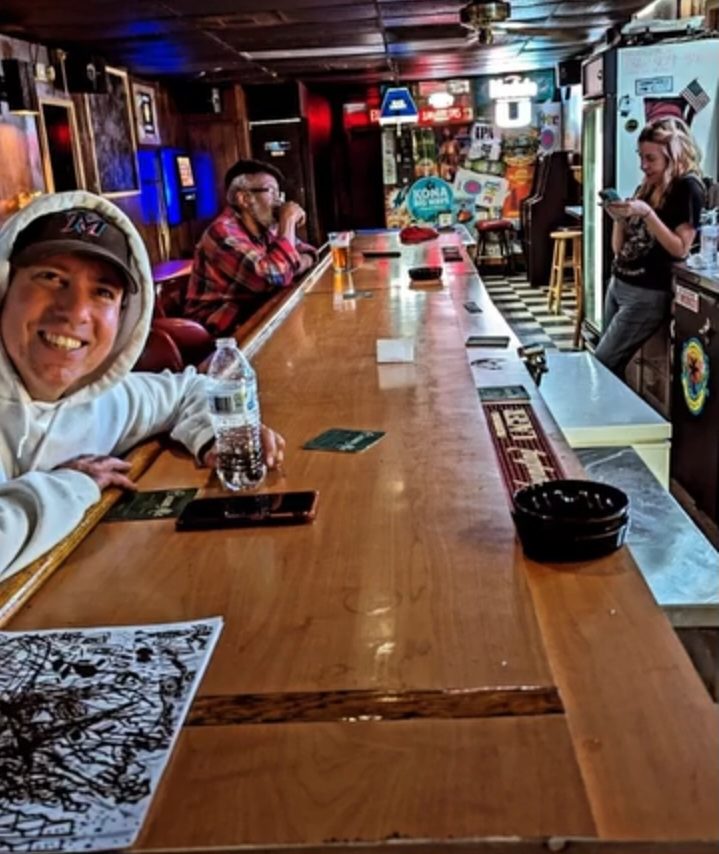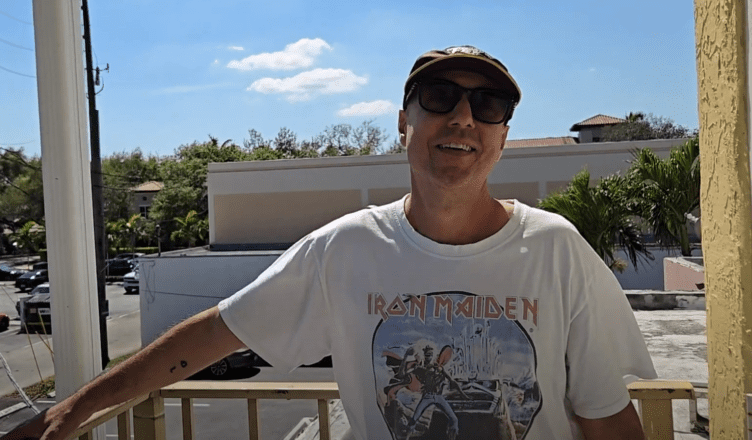Jason Handelsman hasn’t had a moment to catch his breath in the last year. As frontman of Gucci Handelsman, he’s been riding a whirlwind of creative momentum—recording a new album featuring Woodstock percussion legend Daniel Ben Zebulon while mounting over twenty-five performances across South Florida’s underground music circuit.
Yet amid this frenetic pace, David Lynch’s recent passing has forced a pause.
Artists and fans have spent the past few months reflecting on his profound influence on their lives and work. Last Friday, Handelsman visited Fruit Fly Records in Coral Gables ahead of their album release show this weekend. There, he shared the story of his relationship with Lynch—how what began as a routine interview for a local publication evolved into a mentorship centered around Transcendental Meditation, forever altering Handelsman’s life.
You’ve mentioned reciting a mantra during meditation. Have you ever uttered your mantra to anyone or spoken it outside of your practice?
Jason Handelsman: The mantra is something in the air, as David Lynch would say. Everything I learned about TM, besides my own regular practice of about 11 years, came from conversations with David Lynch. He explained how it would fit my life personally, and everything he said proved true.
One of the foundational aspects of TM is that the mantra is given to you after completing three days of training. I can’t share it—I can only use it during meditation for 20 minutes, twice daily.
Can you tell us what language it’s in?
It’s not really a language. It’s comparable to when I’m creating drone sounds with my guitar through my SUNN amp and pedals—there’s no word that accurately describes that sound. The mantra produces a drone-like effect when you focus on it. You have to allow it to emerge naturally in your mind rather than forcefully repeating it. Other thoughts will come, of course, but once you quiet the mind, only the mantra remains.
How long are you supposed to meditate?
Twenty minutes, twice a day. There are additional elements for transitioning in and out of meditation, but the core practice lasts twenty minutes, which I time using an app.
Transcendental Meditation is a mental technique utilizing a mantra while sitting. It creates what David Lynch calls an “unbounded field” or “the ocean of consciousness.” Sometimes 11-12 minutes into meditating, I’ll hear Lynch’s voice saying “this is the ocean of consciousness,” and I’ll feel it profoundly.
TM is often called the Rolls-Royce of meditation. I’ve explored other practices, including Zen meditation for several years—even spending days on a snowy mountain in Upstate New York practicing it. The approaches differ significantly. With TM, you don’t follow anyone—you simply practice it.
Why do some people perceive it as a cult?
There is an organizational structure to TM that I’m not deeply familiar with. It’s headquartered in Fairfield, Iowa, at Maharishi University.
Maharishi himself was remarkable in how he introduced the practice to America. David Lynch attended his funeral in India and entered the Ganges when they cremated Maharishi. In India, there are deity statues of Maharishi—many consider him divine.
There are statues of David Lynch in India?
I’ve seen photos of vendors in India who sell deity statues—Krishna and others—and they sometimes display framed photos of Lynch decorated with flowers among these deities. They regard him as a god.
Did your conversations with Lynch ever extend beyond meditation to his film work?
My first interview had strict parameters—I could only ask coffee-related questions because I was reviewing his signature organic coffee line. Securing that interview was challenging. Eventually, his assistant said, “Tomorrow, 1 PM Pacific time, ten minutes only, coffee-related questions.”
I had 24 hours to prepare. Some friends discouraged me, saying I shouldn’t interview him, but I was determined.
I’ve interviewed many artists I respect, but with Lynch, it was different. Some people actually warned me against speaking with him, claiming he was a “Satan worshipper.” I found myself conflicted.
During the call, I mentioned my review of Inland Empire and he said, “Oh yeah, Michael showed that to me.” I was surprised he had read my piece. I had also referenced him in a song that I sent them, which they apparently listened to. He understood where I was coming from.
Lynch is quite spiritual. He quoted the Bible to me regarding Transcendental Meditation—specifically Matthew 6:33.
What part of the Bible did he quote?
He referenced Matthew 6:33 in relation to TM. I was confident in my analysis of “Inland Empire,” despite its challenging nature. I kept notes while watching, thinking, “I love David Lynch!”
Seeing his films in theaters is an immersive experience, comparable to visiting Hawaii.
Recently, Gables Art Cinema screened several of his films. It’s refreshing to experience them in theaters—that’s clearly how “Mulholland Drive” was intended to be viewed.
That’s his medium. Watching his work on a phone doesn’t do it justice. If I tried to watch a Lynch film on a phone, I could almost hear him saying, “Put that down!”
Like in that video where he criticized people for watching films on small screens.
That reminds me of my first interview experience. I was anxious, with people telling me, “Don’t interview Lynch, don’t practice TM, he’ll try to convert you.” Some claimed it was “demonic” or “Hindu.” Meanwhile, he had already offered me a scholarship for TM training. I questioned whether these were concerned friends or simply detractors.
When I first called him, I had everything prepared for recording. I phoned a few minutes early and spoke with a receptionist. While on hold, waiting for Lynch, my recording equipment malfunctioned. When he answered, I explained the technical difficulties, and he calmly said, “Jason, don’t panic, fix it and call me right back. I’ll be right here.” So I resolved the issue and called back.
Did you record other interviews or just that one?
I recorded all of them, though I had limited preparation time for the others. My life became centered around waiting for the next opportunity to speak with Lynch.
I was working with my brother during this period, and he was curious about my intentions. This was also a difficult time personally—I had legal troubles after a serious incident while under the influence. I was on probation and fulfilling community service at a church.
The Bible verse Lynch quoted—”The kingdom of heaven lies within”—resonated with me. He encouraged me to share TM with my church community, saying, “Tell all your people, Christians, Protestants…” He was passionate about promoting both TM and his coffee.

So he uses “drink” to describe practicing TM as well? It’s like coffee to him?
There are people who adhere strictly to TM protocols, like certified teachers. Lynch will tell you, “I’m not a teacher. I practice TM.” That’s his approach to it.
To become a TM teacher, which I’ve inquired about, requires living in Thailand for five months and costs around $20,000. I contacted the David Lynch Foundation about financial assistance, but they declined. I’m grateful for what I’ve received, but the additional expenses are prohibitive given my current obligations.
Lynch expressed confidence that someday I could “give the gift of TM” to someone who needs it. He recognized that I needed this practice in my life.
I shared with him how I watched “Mulholland Drive” repeatedly in a theater after 9/11 in New York, during a difficult period in my early twenties involving divorce and personal struggles. I would arrive just in time, sitting in the front row of an almost empty theater.
I would call him “Dr. Lynch” because of his honorary doctorate from Maharishi University. I’d begin discussing scenes from his films, and he would patiently listen.
Did you discuss the character behind Winkie’s?
We didn’t delve into specifics. I was primarily expressing how meaningful his work is to so many people, including myself.
Lynch’s directorial persona reflects confidence and self-assurance. Despite his father’s pressure to “get a job,” he committed to his artistic vision, spending six years in his Philadelphia studio creating his dream project.
The path may sound simple, but it required tremendous sacrifice. And through it all, he practiced TM twice daily, never missing a session in over 40 years. That level of discipline is remarkable.
Gucci Handelsman, with Daniel Ben Zebulon, Rat Bastard. Bitter Lake, Kolin Zein, Kleegy the Klown, Arch Stanton, Dick Trump, AonQ, and Sky Below the Sun, 1 p.m. Sunday, March 30, at Fruit Fly Records, 430 S. Dixie Highway #205, Coral Gables, FL & 9pm Wednesday, April 2 at The Club, 14247 NW 7th Ave, North Miami, FL.


